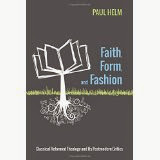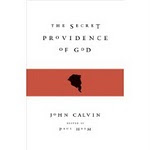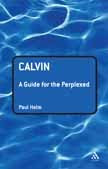"When I use
a word," Humpty Dumpty said, in rather a scornful tone, "it means
just what I choose it to mean—neither more nor less."
"The question is," said Alice, "whether you can make words mean so many different things."
"The question is," said Humpty Dumpty, "which is to be master—that's all."
"The question is," said Alice, "whether you can make words mean so many different things."
"The question is," said Humpty Dumpty, "which is to be master—that's all."
The
quotation-marks around ’Calvinism’ in the title are not accidental. We are here
primarily concerned with the issue between Alice and Humpty Dumpty.
The issue is about the words, not things, and in particular the fact that
various people have various things to say about the word 'Calvinism' at present
- its legitimacy, and what it refers to and may refer to. Words can be fought
over. Whoever captures the word, captures the thing. But frequently the
words resist capture. I shall argue, the word ‘Calvinism’ wriggles
freely, for good or ill. I shall sketch two such attempts at capture, one
scholarly, the other rougher, to capture the meaning of ‘Calvinism’. Each
fails, as it must. The rougher attempt first.
‘Doctrinal Calvinism’
There
are those who are disquieted over the fact that many are claiming the name
‘Calvinism’ for themselves who are Baptists, and many who are
charismatics do the same. Shock-horror! Charismatic Baptists? Where will it
end? Such people tut-tut like the Dame in a Pantomime. But it is nothing new
for people to adopt the name ‘Calvinist’ or ‘Calvinism’ for something narrow
than was produced by the copious theological mind of John Calvin. I remember
that in my youth , in the damp cellar of a Preston second-hand
bookshop, I came across some books in the series called ‘Doctrinal
Calvinism’, published in the nineteenth century. I think that of the
two or three titles I retrieved – I have them no longer, alas - one
contained a selection of the writings of Bishop Ezekiel Hopkins, another of
John Bunyan, and maybe one of John Howe, one-time Chaplain to Oliver
Cromwell. An Anglican and a Baptist and a Congregationalist, I believe, each
‘doctrinal Calvinists’. To be sure, that title was not a self-description, but
one given to them. But it was not an unreasonable title. I remember also for a
time possessing the Works of Hopkins, which Thornton’s bookshop in Oxford sold
me, which contained an exposition of the covenants worthy of
Witsius. He was Bishop of Londonderry, I believe.
What
on earth, then, was doctrinal Calvinism? It was, and is, I think, the
soteriology that is to be found in first 20 or so Chapters of the Westminster
Confession and which was adopted by the Savoy Confession (or Declaration) of
1658, and the Baptist Confession of 1689 almost verbatim. (You
can see the 3 confessions compared here. (http://www.proginosko.com/docs/wcf_sdfo_lbcf.html)
The publishers of the books I mentioned no doubt
hoped to tap into this ‘Calvinism’ that was common to people in the C of E and
among Dissenters. (And now, perhaps, 'charismatic' is a word that also currently
receives the Humpty Dumpty treatment.) A smart marketing ploy, in my view. There is a lot
more to these chapters of the Confession than the famous Five Points, of
course. The adopting of these parts of Westminster was carried out in the
conviction that there is a logically contingent connection between the theological
material expressed in these chapters, and ecclesiology, as there is.
Those
who raise their eyebrows at such behaviour have the idea that Calvinism is not
only a theology but an ecclesiology. Certainly Calvin’s theology comprises not
only Book I-III of the Institutes but Book IV as well, the
longest book of the four, and it could be argued, the climax of the whole
production. But there is a problem for those who make this claim
these days, for embedded within Book IV is an account of the duty of the civil
magistrate to uphold the true or Reformed religion from anything in the civil
realm that would tend to undermine it, beginning with the outlawing of
untrammelled proclamations of other religious teachings, such as those of Rome,
or of Faustus Socinus, or of the Jews or Turks. And I don’t think that those
who believe that presbyterian church-government is an intrinsic part of
Calvin’s theology nowadays routinely think that intolerance of other religions
is or ought to be an intrinsic part of the civil magistrate’s duties.
They could say that it is a part of Calvinism, but that they disagree
with it. Not the sort of precedent they want to set, I assume
‘Calvinist’ or ‘Reformed’?
Besides
this rather shrill opposition to ‘doctrinal Calvinism’ , as a bona
fide expression of Calvinism at a more scholarly level, it
is increasingly being pointed out that ‘Calvinism’ is misleading as the
name for the theological trajectory of Reformed Orthodoxy. Calvin was a member
of a theological team, not a one-man team, nor its captain. What developed
after his death in the Reformed Church is no more ‘Calvinism’ than it is
‘Bucerism’ or ‘Zanchism’, even though Calvin achieved a greater prominence than
these, for a variety of reasons, not least the prestige of Geneva as a centre
of the Reformation.
It is also pointed out that
what is misleadingly called ‘Calvinism’ can mean less than the ‘Five Points’,
and also more than them in that as Reformed theology developed there were
various emphases given to Christian doctrine by different individuals and
theological schools. An account of some of these differences in respect of the
work of Christ can be seen worked out by Richard Muller with his usual care and
erudition in Calvin and the Reformed Tradition: On The
Work Of Christ And The Order Of Salvation. So
within the parameters set not by Calvin but by the various Reformed Confessions
there was a considerable difference in emphasis. Confessions of faith are,
after all, political documents.
These claims about the
relatively narrow scope of ‘Calvinism’ in Reformed theology are based on
a historiography which pays some attention to lines of sameness as well as of
divergence in the teaching of the Reformer. But it recognises that much of the
legacy of John Calvin was underdetermined by comparison with the theology that
was developed later, theology that even so was indebted to Calvin. Areas of
such development are, for example, the decrees of God, and the covenants, and
the work of Christ. Calvin cannot be held responsible for theological
constructions of his legacy, occurring after his death, any more than, say,
Andrew Fuller, who defended the propriety of general invitations of the gospel,
can be held responsible for every preaching extravagance that people since
Fuller have thought was an ‘offer of Christ’. Those who wish
to dissent from these scholarly claims will have their work cut out to do so.
They will have to present a much more detailed Calvinism than they are used to
doing.
Which is yours?
But note that this restriction of ‘Calvinism’ to
Calvin’s own theology, and resistance to its extension to the theology that
engendered the Confessions, and to which they in turn gave rise, begins with
the earlier view of ‘Calvinism’, the ‘Calvinism’ of the Five Points and of
doctrinal Calvinism. (Not the same thing, but each has a solely soteriological
emphasis.) The scholarly critique recognises or legitimises that ‘doctrinal
Calvinism’ we noted earlier, legitimises it by taking it seriously. Its
critique is more scholarly than that of the whingers were noted earlier, but it
is a criticism which legitimises what it is a criticism of. Not even
scholarship is capable of copyrighting ‘Calvinism’.
So which is yours to
be, the ‘Calvinism’ of the 5 points, a ‘doctrinal
Calvinism’, a ‘Calvinism’ which identifies it with Calvin’s children, who went
their own way when the discussion went beyond Calvin himself, or the ‘full
package Calvinism’, which is not a full package at all, since Calvin’s view of
the magistrate’s role in upholding the Reformed faith has been excised from it?
(And in this roll-call 'Neo-calvinism in its various guises has not even been
mentioned. )
Whichever it is, no-one can
stop you calling your choice ‘Calvinism’. You see, unlike ‘Cadbury’s’ or
‘Chevrolet’ or ‘Calvin Klein’ ’ there is no copyright or trademark that
covers the use of the word ‘Calvinism’. Any more than with 'inerrancy' or
'justification' or any other central theological term.
Irritating, isn’t it?









